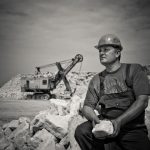
Goldfields mining is a process that involves extracting gold from deposits found in the earth. In order to do this, special equipment and techniques must be used to remove the gold from the surrounding rock. Goldfields mining can be a very lucrative business, but it is also very complex. In this article, we will discuss the basics of Goldfields mining and answer some of the most common questions people have about it.
What is Goldfields mining?
Goldfields mining is the process of extracting gold from deposits found in the earth. Gold has been used by humans for centuries, and its value has only increased over time. Gold is a valuable commodity because it is rare, durable, and easy to trade. The most common way to extract gold from the earth is through Goldfields mining.
How does Goldfields mining work?
In order to extract gold from the earth, special equipment and techniques must be used. First, prospectors will look for areas where gold might be found. Once a potential gold deposit is found, miners will use heavy machinery to dig into the earth and remove the gold-bearing rock. This rock is then crushed and the gold is extracted using a chemical process. Goldfields mining is a dangerous job, and accidents often happen.
What are the benefits of Goldfields mining?
Goldfields mining is important because it allows us to extract gold from the earth. This gold can be used in a variety of ways, including jewelry, coins, and even electronic devices. Gold is also valuable for its industrial applications. Gold fields mining provides many jobs for people around the world, and it helps to support our economy.
What are the drawbacks of Goldfields mining?
Goldfields mining can have a negative impact on the environment. The chemicals used to extract gold from the rock can pollute the air and water near mine sites. Goldfields mining can also cause sinkholes, landslides, and soil erosion. These environmental problems can harm plants, animals, and people who live near Goldfield’s mining sites.
Goldfields mining is a controversial topic, and there are many pros and cons to consider. However, it is important to remember that Goldfields mining provides many benefits to the economy and to society as a whole. Goldfields mining is an essential part of our world, and it will continue to be so for many years to come.
In conclusion, Goldfields mining is a complex and controversial topic. There are many pros and cons to consider, but it is an essential part of our world. Goldfields mining provides many benefits to the economy and to society as a whole. Thank you for reading! I hope this article has been informative.


